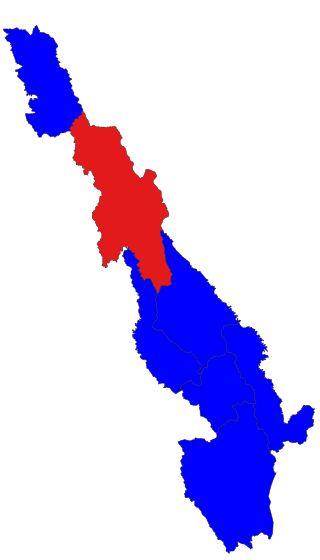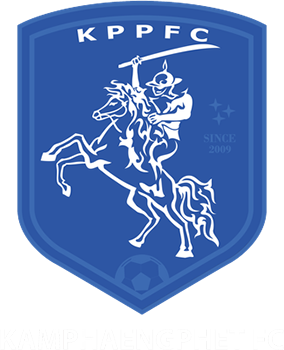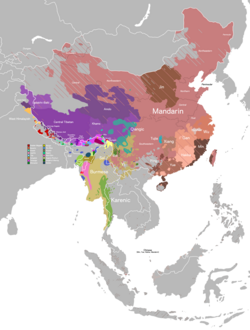Related Research Articles

Phrae is one of Thailand's seventy-six Provinces (changwat) lies in upper northern Thailand. Neighboring provinces are Phayao, Nan, Uttaradit, Sukhothai, and Lampang.

The Karen, also known as the Kayin, Kariang or Kawthoolese, are an ethnolinguistic group of Sino-Tibetan language–speaking peoples. The group as a whole is heterogeneous and disparate as many Karen ethnic groups do not associate or identify with each other culturally or linguistically. These Karen groups reside primarily in Kayin State, southern and southeastern Myanmar. The Karen, approximately five million people, account for approximately seven percent of the Burmese population. Many Karen have migrated to Thailand, having settled mostly on the Myanmar–Thailand border. A few Karen have settled in the Andaman and Nicobar Islands, India, and other Southeast Asian and East Asian countries.

Phrae is a town in northern Thailand, capital of Phrae Province.

The Karen or Karenic languages are tonal languages spoken by some 4.5 million Karen people. They are of unclear affiliation within the Sino-Tibetan languages. The Karen languages are written using the Karen script. The three main branches are Sgaw, Pwo and Pa'O. Karenni and Kayan are a branch of Karen languages. They are unusual among the Sino-Tibetan languages in having a subject–verb–object word order; other than Karen, Bai and the Chinese languages, Sino-Tibetan languages have a subject–object–verb order. This is likely due to influence from neighboring Mon and Tai languages.

Mueang Phrae is the capital district of Phrae province, northern Thailand.

Long is a district (amphoe) in the western part of Phrae province, northern Thailand.
The Pwo Karen language is one of the main groups of the Karen languages, alongside the S'gaw Karen language and Pa'O. The Pwo Karen language contains four different dialects, which are at best marginally mutually intelligible:

The peopling of Thailand refers to the process by which the ethnic groups that comprise the population of present-day Thailand came to inhabit the region.

The S'gaw,(S'gaw Karen: စှီၤ or ပှၤကညီဖိ) also known as Skaw, S'gaw, S'gau, White Karen, Paganyaw, Pgaz Cgauz and Pakayo, are an ethnic group of Burma and Thailand. They speak the S'gaw Karen language.

Hpapun Township is a township of Hpapun District in the Karen State of Myanmar. It lies on the border of Thailand across the Salween River. The central part of the township is bounded on the west by the Yunzalin River. Hpapun Township's administrative center is Papun.

Kamphaengphet Football Club is a Thailand professional football club based in Kamphaeng Phet Province. The club currently plays in Thai League 3 Northern region.
Mpi is a Loloish language of Thailand. The number of speakers is in decline. It is spoken in the following two villages in northern Thailand.
Eastern Pwo or Phlou, is a Karen language spoken by Eastern Pwo people and over a million people in Myanmar and by about 50,000 in Thailand, where it has been called Southern Pwo. It is not intelligible with other varieties of Pwo, with which it shares 63 to 65% lexical similarity. The Eastern Pwo dialects share 91 to 97% lexical similarity.

Phae Mueang Phi is a place with original rock formations in the Phi Pan Nam Range, Thailand. It is about eight kilometres northeast of Phrae town in Mueang Phrae District, Phrae Province.
Northern Pwo, or Phlong, is a Karen language of Thailand. It is not intelligible with other varieties of Pwo, though it is close to Phrae Pwo. Northern Pwo consists of the mutually intelligible dialects of Mae Ping, Omkoi (Hod), and Mae Sarieng.

The Karen conflict is an armed conflict in Kayin State, Myanmar. It is part of the wider internal conflict in Myanmar between the military government and various minority groups. Karen nationalists have been fighting for an independent state, known as Kawthoolei, since 1949. The Karen National Union (KNU) and its Karen National Liberation Army (KNLA) are the most prominent Karen rebel groups. Hundreds of thousands of civilians have been displaced by the conflict, many of whom fled to neighbouring Thailand and survive in refugee camps.
The Leke script, previously known as Karen Chicken Scratch script, is an abugida used to write the Pwo Karen language and Sgaw language in Burma (Myanmar) and Thailand. It has 25 consonants, 17 vowels and 3 tones. The script also has a unique set of numerals and punctuation, such as a full stop (period) and a comma.

Ban Pin railway station is a railway station in Ban Pin Sub-district, Long District, Phrae Province, Thailand. It is a class 2 railway station 563.865 km from Bangkok railway station. It is on the Northern Line of the State Railway of Thailand. The station opened in June 1914, following the Northern Line extension from Huai Mae Ta to Ban Pin. The line continued to Pha Khan in 1915.
Proto-Karenic or Proto-Karen is the reconstructed ancestor of the Karenic languages.
The Ngiao rebellion in 1902 was an uprising of Tai Yai people against Siamese rule, in what is now Phrae province in northern Thailand. It arose as resistance to centralizing reforms initiated by King Chulalongkorn, particularly the levying of taxes and the adoption of the Monthon Thesaphiban provincial administration system, as well as the partitioning of territory with the British, which forced the Shan to adopt either British or Siamese nationality. In the morning of 25 July 1902, rebels attacked and looted the town of Phrae, killing over twenty government officials including the royal commissioner, Phraya Ratcharitthanon. The rebellion was soon quelled by troops from Bangkok led by Chaophraya Surasakmontri. Ten rebel leaders were executed, sixteen were took to Bangkok for imprisonment, and Chao Phiriya Thepphawong, the ruler of Phrae, escaped into exile in Luang Phrabang.
References
- ↑ Phrae Pwo at Ethnologue (18th ed., 2015) (subscription required)
